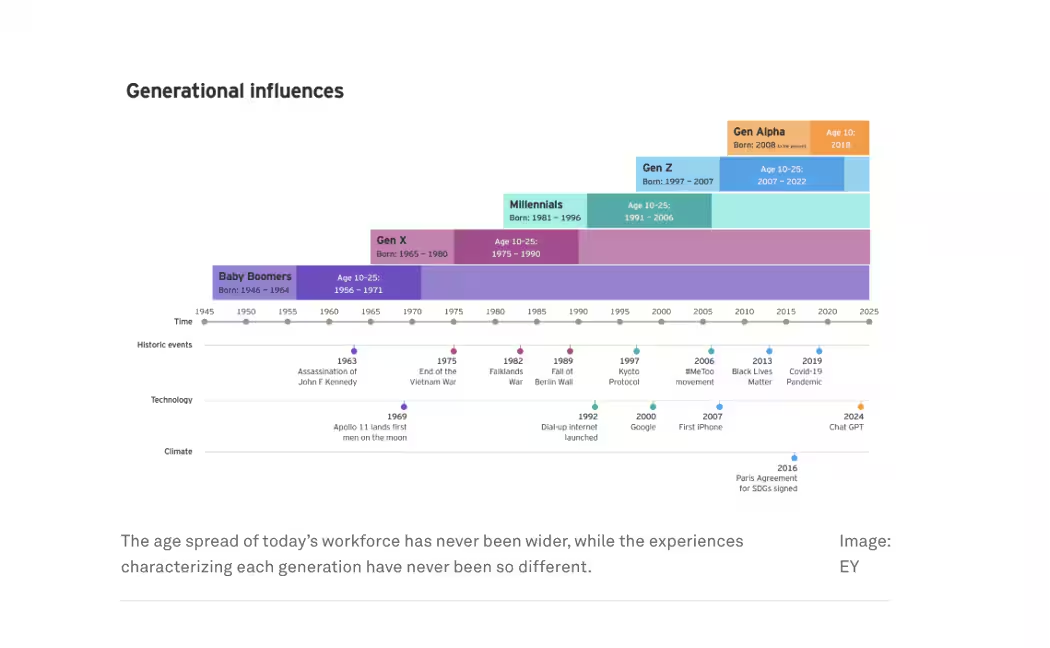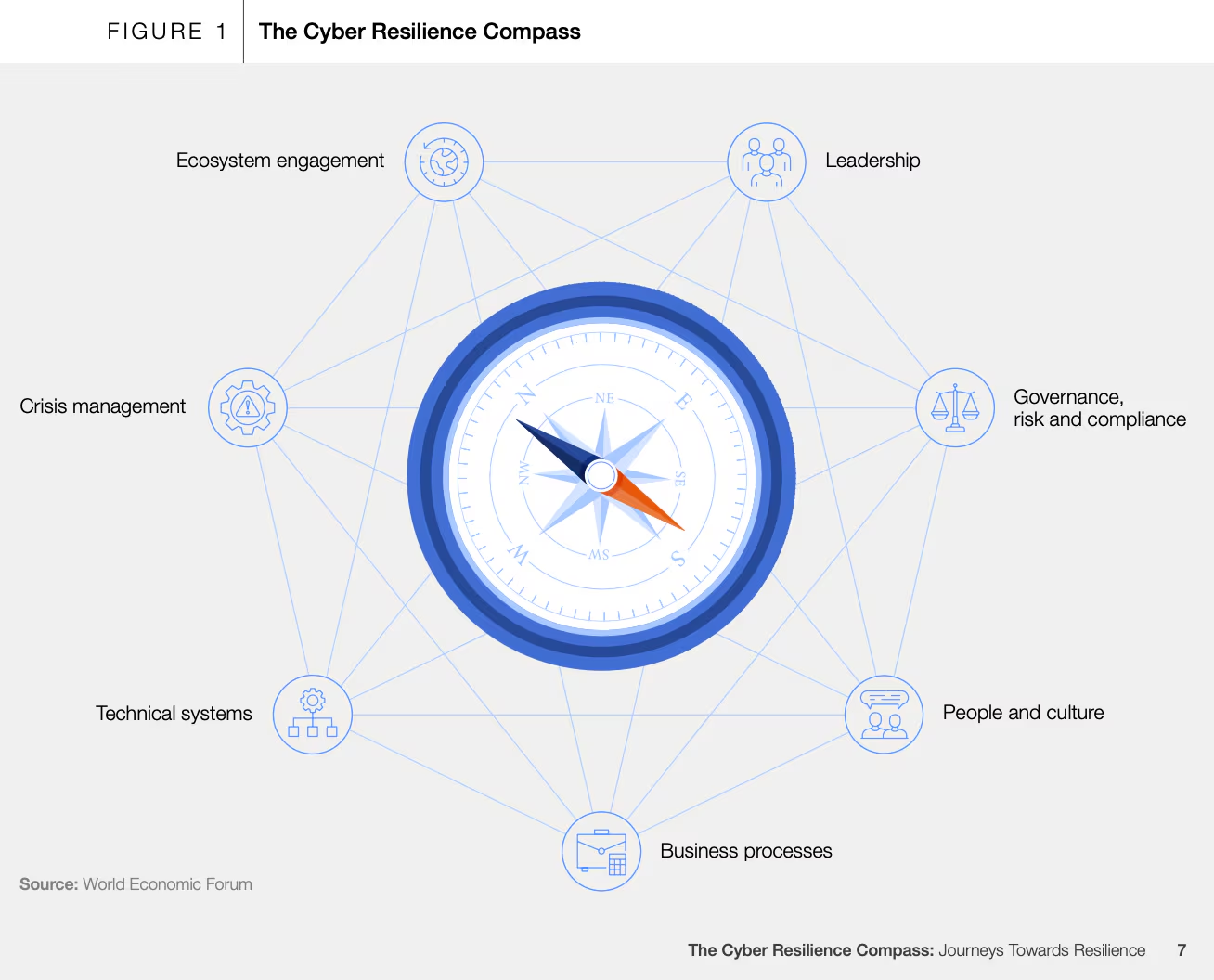· 6 min read
• Generation Z – people born between the mid-1990s and the early 2010s – have never known a world without the internet, which means they intuitively understand digital systems.
• This will create a new agenda for cybersecurity that aligns with values such as sustainability and inclusivity.
• Organizations must adapt to embrace sustainable, borderless collaboration and values-driven cybersecurity to thrive in this new digital era.
Imagine a world where the very generation that has never known life without the internet is becoming the dominant force in the global workforce. This isn't a distant future – last year, Generation Z overtook Baby Boomers in the full-time American workforce. This shift is amplified globally, with 1.2 billion young people expected to enter the workforce over the next decade.
This isn’t just about numbers. This milestone signals a foundational shift in values, expectations and worldviews as Gen Z is set to become the largest, richest and most influential workforce cohort shaping our economies – and, consequently, a new cyber agenda.
Born between 1996 or 1997 and 2012, Gen Z has never known a world without the internet. They are the first true digital natives and this immersion has shaped them into a generation that intuitively understands digital systems and expects them to operate transparently, inclusively and responsibly.
To this cohort, cybersecurity is no longer just a technical or compliance issue, it's a systemic challenge woven into everything from environmental resilience to economic justice and human rights.

Each generation is defined by very different experiences.
Source: EY
A more sustainable cyber agenda
For Gen Z, sustainability is not a preference, it’s a core principle. Having grown up amid intensifying climate disruption, Zoomers bring a deep sense of ecological urgency to their consumer choices, career paths and expectations of the companies they engage with. According to Deloitte, 70% of Gen Z consider a company's environmental credentials when choosing an employer and nearly two-thirds are willing to pay more for sustainable products or services.
This commitment is reshaping not only global business strategy but the cyber ecosystem itself. As investment in the low-carbon economy surpasses $2.1 trillion, next-generation energy grids, sustainable telecoms, electrified transport and new Internet of Things-heavy infrastructures are expanding rapidly. But so is the cyberattack surface – attacks on energy and utilities surged by 80% in the past year alone.
Cybersecurity must now protect an increasingly complex digital infrastructure while reducing its own environmental footprint. Data centre electricity demand driven by AI adoption, including the cyber industry, is set to double by 2030. Deeply aware of climate disruption, Gen Z leaders and consumers will increasingly demand accountability for the environmental impact of digital operations, including cybersecurity.
Companies like Microsoft are already pioneering this approach by committing to carbon-negative operations while simultaneously expanding their cybersecurity footprint. Google has also pledged to transition to clean energy data centres. We should anticipate the rise of “Cyber Sustainability Officers”, greener security operations, sustainable procurement standards and energy-conscious architectures. In the future, securing the digital world will also mean securing its environmental foundations.
A digitally native threat landscape
As the first true internet generation, Gen Z has fundamentally reshaped the ecosystem around their “always-on, always-available, always-accessible” global expectations. This propensity for constant engagement propels the proliferation of fully distributed global infrastructures. This is transforming traditional sectors and also forging entirely new economies like cryptocurrency and online gaming.
It is precisely Gen Z's enthusiastic embrace and rapid adoption of these nascent, globally interconnected digital industries that are proving to be particularly ripe targets for malicious actors. Nowhere is this clearer than in the Gen Z-driven cryptocurrency economy, a market surpassing the GDP of France, and an asset this generation is four times more likely to hold than a retirement account.
But this sector stands at the epicenter of global cybercrime, with direct hacking of cryptocurrency exchanges last year resulting in over $2.2 billion in losses. Many of these exchanges operate in less mature jurisdictions.
This is particularly pronounced because Gen Z drives digital adoption in emerging markets. And as this digital growth expands, so does exposure to cyberthreats, with new ecosystems emerging in less regulated but digitally active markets.
This shift is already underway. INTERPOL’s 2025 Africa Cyberthreat Assessment reports a sharp rise in ransomware, business email compromise and online scams across the continent. Meanwhile, Southeast Asian crime syndicates are reportedly leveraging weak governance in places like Cambodia and Myanmar to run industrial-scale online fraud operations that generate billions in illicit revenue and exploit vulnerable populations through forced cybercrime labour.
Values-driven governance frameworks
At the international level, Gen Z's influence is driving a fundamental shift toward multilateral cyber governance that prioritizes human rights alongside national security interests. Unlike previous generations that accepted fragmented, nation-state-centric approaches to cyber policy, Gen Z advocates for harmonized global standards that reflect their lived experience of borderless digital communities.
Young cyber policy advocates from organizations like Access Now and Global Partners Digital are successfully pushing for models that mandate community consultation, require algorithmic transparency and establish binding international standards for cross-border data protection. Their message to policy-makers is clear: In a globally connected ecosystem, cybersecurity governance must be as borderless and inclusive as the threats it addresses.
This values-driven approach is also reshaping corporate cybersecurity governance. Younger consumers will drive the need for ethical security architecture, which embeds privacy-by-design, audits for algorithmic bias and the adoption of transparent response protocols that prioritize user rights over brand protection.
We can also expect governance to evolve further, incorporating frameworks like Digital Equity Reporting to assess the societal impact of security decisions. Early signals of this shift are visible in how companies like Equifax have responded to past breaches by publishing transparent annual reports to rebuild trust and demonstrate accountability.
Ultimately, this generation sees cybersecurity governance not as a technical necessity but as a reflection of corporate values. And they’re willing to take their business elsewhere if those values fall short.

How an organization approaches cybersecurity will vary but the Cyber Resilience Compass shows practices that can help guide businesses.
Source: The Cyber Resilience Compass 2025, World Economic Forum
Harnessing Gen Z's global cybersecurity vision
The question isn't whether Gen Z will transform cybersecurity, it’s whether organizations can adapt quickly enough to harness their vision. Those that embrace sustainable, borderless collaboration and values-driven security will be defending everyone’s digital future. The World Economic Forum is also championing these collective solutions through initiatives like the Cyber Resilience in Industries and AI and Cyber programmes.
But action must also come from individual enterprises. Organizations can appoint Chief Sustainability Officers with cybersecurity mandates, invest in values-based security training that includes social impact and actively engage in international cyber governance initiatives. The alternative is being left behind by a generation that sees cybersecurity not as a technical challenge, but as a fundamental question of how we want to live in a digital world.
As the most connected generation inherits the consequences of cyber insecurity, their expectations for fairness, transparency and accountability will define the next era of cyber governance. The future belongs to those who understand that securing our digital world means securing it sustainably and inclusively.
This article is also published on the World Economic Forum. illuminem Voices is a democratic space presenting the thoughts and opinions of leading Sustainability & Energy writers, their opinions do not necessarily represent those of illuminem.






